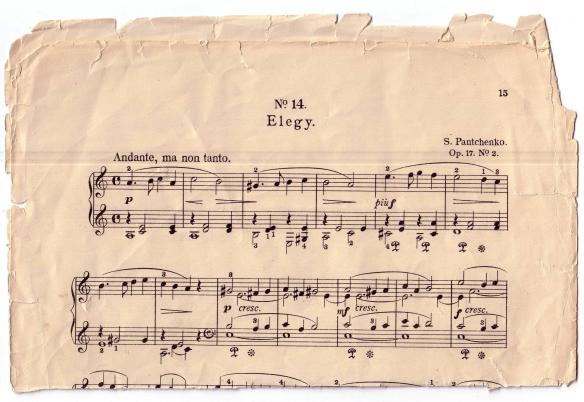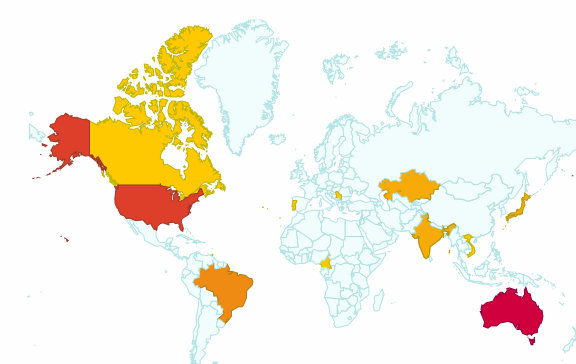When Cheryl entered my writing and teaching life, one of the first things she did was to give some of my students a place to read their poems. This happened as part of her poetry and music series Wake Up and Smell the Poetry, which takes place one Saturday morning each month, in the recording studios of the Hopkinton, Massachusetts Community Access channel, HCAM. (Edited video recordings are used in HCAM's broadcast programming, and can also be watched online. The ongoing series is available to any community video channel that requests it.)
From this series so full of treasures, I still treasure most the experience of listening as my students read to adult strangers. It's the kind of memory in which I know exactly where I was sitting, in semi-darkness, stunned by the bravery Cheryl elicited from them, too.
Here's an example of Cheryl's impact on me. Because of her, I've performed--many times, by now--a poem-and-music version of a poem called "Russian Music for Piano." As I was preparing a reading for a place with a piano, Cheryl suggested that I could play, between sections of the poem, parts of the simple piano pieces the poem describes and traces through my life. Every time I've repeated this performance I've come to understand both poem and music in new ways, deeply grateful to my listeners for the glimpses into their own lives they've shared with me in response.
 |
|
You can read Cheryl's very different and fascinating answers to the same questions, at http://www.blog.cherylperreault.com/ I've persuaded a few other writers to do the same on their blogs, and you'll find their responses to the questions sometime soon, on the blogs I list at the bottom. Meanwhile, I've linked to great things they've posted recently.
What am I writing/working on?
In my poetry, I seem to be turning a corner, right this very minute. I recently became gloriously overwhelmed by a writing workshop at the Joiner Institute for the Study of War and Social Consequences, at UMass Boston. I went there wanting to write more bravely and accurately about my father's war, and its impact in his life and within our family. Sometimes intentions bear fruit directly as well as indirectly, and most of the new poems I've been drafting rise out of the experience and encouragement and rich provocation of the Joiner Institute. (You can read some about my teacher-as-student experience at the Joiner here, and some thoughts about writing as peacemaking here.)
I'm still revising my full-length poetry manuscript, What There Is. Do you live next door to a publisher who's searching for poetry manuscripts? Please let me know. (Okay, joke. If you went excavating, you'd probably find at least one poetry manuscript searching for a publisher in every corner mailbox you pass. Or you can imagine the equivalent in electrons--since poetry submissions increasingly happen online.)
Meanwhile, at A Year to Think It Over I continue to write about "the daily texture of progressive education," trying to do justice to the experience of teaching in a place where I could truly come to know and work for my students. I'm also trying to describe what it was like to learn with my students, and with parents and colleagues.
How does my writing differ from other writing in its genre?
My poems are more structured than some, and less structured than others. They're simpler than some and more complicated than others. Here's a tiny sample, if you scroll down. I never intend my poems to be puzzles--I don't think most poets intend to write puzzles--but I figure it's legit to expect a second reading.
I love giving live public readings--but I'm also interested in each poem as a visual object on a page, in the effects of line breaks and stanza breaks and margin choices. Emphasis on the word choices.
I've been told that my blog entries aren't actually blog entries; they're essays. That's probably a fair critique.
Why do I write what I write?
I write in short forms because it feels right to me.
Grace Paley, when asked why she wrote short stories instead of novels, answered that life is too short for the writing of novels. I'd say the same thing, only more so. Life feels too short even for short stories! I love working on poems short enough so I can carry them around in my head, but still long enough so I can get into trouble, and swim back to shore through the writing and revising of the poem, learning as I go.
Blog entries are the poems of the creative non-fiction world. Snacks. Well, no--tweets are snacks, I guess. Maybe blog entries are light meals to be eaten on the trail? But I'm still working on how to construct the smallest, tightest package of ideas that also feels rich enough.
Here's another kind of answer: Both my parents wrote poems which weren't published but had a life in the family and community. (I'm spending some of my time this summer helping my mother work toward a new collection of her poems.) To me as a kid, writing poetry seemed like a normal thing to do--as if I'd grown up in Russia, say, or some other parts of the world. (Yet another kind of luck.)
I'm not going to say I have to write, but my life is immeasurably more thoughtful and more joyful, both, because I do. That's what I've wanted to give to the hundreds of students I've worked with as children or adults. Thoughtful includes responsible, and joyful includes wild and spontaneous. So there you are, dancing in that same duality--or "creative tension", in the words of Dick Zajchowski, formative Touchstone School Head--that I've sought to embrace in all my teaching life. Serious playfulness. Playful seriousness.
And here's yet another kind of answer: Sometimes I think that I might shamelessly pretend to write, in order to have the pleasure of friendships with other writers. In some overwhelmed or blocked chapters of my life, that's been approximately the case.
How does my writing process work?
I have no idea how my writing process works. I have no method except paying attention, and no philosophy except the learned benefit of giving myself permission to engage in a phenomenally inefficient language activity.
I'm slow, at every kind of writing I do, especially poems--and slow at almost everything else I do, also. Quite a few people live in here, and what I say in ordinary conversation often seems messy or slipshod, and true to only a minority of them. In writing I've learned to give all those selves a chance. The process of revision, very important to me, is a kind of coming to consensus. Increasingly, though, I hope for the kind of consensus in which different voices can live side by side, and be a chorus instead of a riot. (Still, somewhere down the road I might want a riot instead of a chorus.)
My future blog plans:
I'm posting this on two blogs, on an old, neglected one called Villages, and also on A Year to Think It Over.
I've never had plans for the poetry blog, and it's not exactly about poetry. Pin me down and I'll say Villages is about virtual villages created by language. I've enjoyed imagining myself as a member of a village that includes Charles Darwin, or the Canadian writer Val Ross, or all the people I love, finally in one place. But I have no idea what will happen next there, and this will be only the fourth post.
What about the blog about teaching and learning? I do expect I'll come to a time when I'm ready to move on. I hope I'll be able to keep paying for the domain, so those anonymous wonderful whoever-you-are people in Australia, the country of my most faithful audience, will still be able to find the posts they like.
 Readers
arrive from other countries, too. In the past few days, for example,
the blog has been read by people in Vietnam and Kazakhstan and Brazil
and Cameroon and Serbia (among others)--and even the United States.
Monitoring my blog I refresh my memory of geography. A world map
highlights the countries of readers, and if I scroll over the country
list I see larger outline maps of each of them. This makes me feel both
fascinated and thwarted. I wish I knew more about all those people (and
their villages)--but Word Press hasn't yet developed that kind of
oversight.
Readers
arrive from other countries, too. In the past few days, for example,
the blog has been read by people in Vietnam and Kazakhstan and Brazil
and Cameroon and Serbia (among others)--and even the United States.
Monitoring my blog I refresh my memory of geography. A world map
highlights the countries of readers, and if I scroll over the country
list I see larger outline maps of each of them. This makes me feel both
fascinated and thwarted. I wish I knew more about all those people (and
their villages)--but Word Press hasn't yet developed that kind of
oversight.Several people have suggested that my blog entries about teaching and learning may have another future as a book. For the time being, though, it works well for me to focus on one little knot of energy at a time, without worrying about larger structure. Does that sound suspiciously like the freedom within which I like to approach each new poem? Or the freedom I tried to give my students? Hmmmmm...
And now, here's your reward if you've made it this far through the longest blog entry I've ever written. Here are links to blogs by three writers I respect, enjoy, and highly recommend.
Alex Dunn works as an environmental educator with magical power to turn kids on to the night sky (just as an example.) I've watched him in action with my own students. He also writes two blogs. The Daily Bird New England tells me when to wake up and view species who've just arrived. Tree swallows! Moogle Gaps feeds my map obsession. I've used the links to send you to some recent posts I enjoyed.
Polly Ingraham has taught in all kinds of schools, including a charter school where she taught with my friend Kate Keller. She writes about all sorts of things, including overlaps between the secular and the sacred, in a blog called The Panorama of a Pastor's Life. Here's a recent post about The Fullness of Time and an organization called A Better Chance.
Colleen Redman lives and works as a poet, photographer, and journalist in Floyd County, Virginia. In one way her blog is very local, focused on the community of artists and musicians and craftpeople and farmers who call Floyd home. Reading Colleen's posts about her community I figure they're lucky to have her, and I start thinking about the individual in community from a new slant--Colleen's! She also writes funny, observant, and moving poems, and you can find her reading aloud a wonderful poem about her brothers' deaths, here.

No comments:
Post a Comment
Join the village!